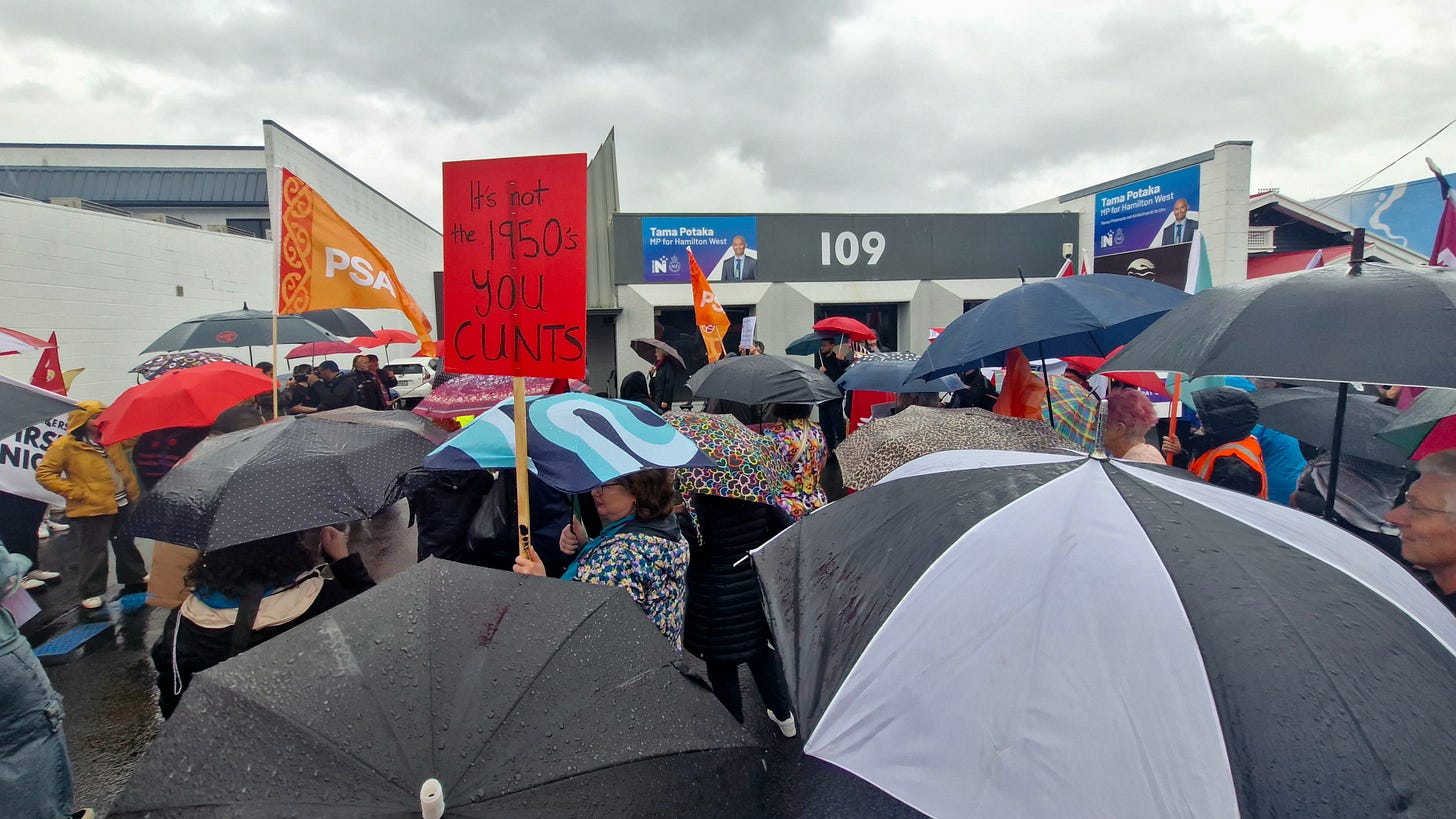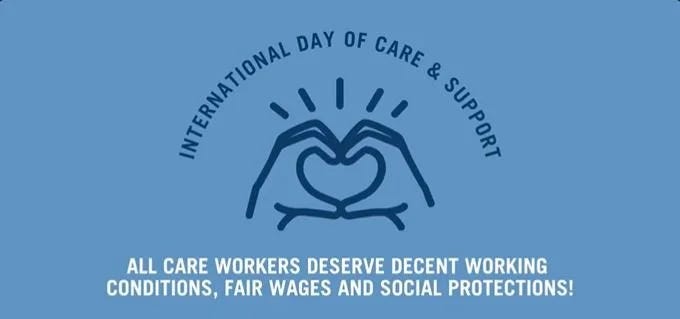Care work in Aotearoa
A post for the International Day of Care and Support.
Yesterday (in Aotearoa at least - today in other parts of the world) was the United Nations International Day of Care and Support. I had a post I planned to write, but it got waylaid by - you guessed it - caring duties.
We’ve been working on developing independence in our 12yo. As many parents and carers of young persons with developmental challenges, cognitive delays, and learning disabilities can attest to, it takes a concerted, intentional effort to develop the skills needed for independent living. Unlike my other children, who all exhibited fierce independence from an early age (necessitating some very careful shepherding and guidance!), our delightful 12yo would happily allow us all to pander to her needs. She’s so lovely many people don’t realise they are doing things for her that she could easily do herself!
Again, as other parents and carers will attest to, developing the foundational skills for independence does require a thick skin, an ability to weather the pushback that occurs, and some knowledge of what is too far too soon and what is entirely realistic. I don’t always get this right - it is very much a trial and error process with ongoing reflecting and revisiting on what is realistic.
Which is a terribly long winded way of saying that yesterday, the 12yo was kicking back on my expectations of her independence after school - notably that she organise her own after school snack (of which there are plenty, in the fridge, freezer, and pantry, all of which she can make herself). Instead of crafting a nice post about the international care and support day, I was calmly repeating myself and ignoring the yelling and crying and kicking while I cooked dinner (much earlier than usual), and then calmly repeating myself while ignoring the yelling and crying about dinner (a known fave). As those who have been through such times will attest, it takes a great deal of energy and patience to remain both outwardly calm and consistently firm.
And then, magically*, she calmed herself down, made herself a smoothie and a bowl of honey weetbix bites, and all was well in her world. I had a glass of wine and a lie down.
Care work isn’t terribly glamorous and mostly we don’t talk about the difficult realities. In part because, as a parent, there are folk lining up around the block to tell you you’re doing it all wrong. It leaves one feeling defensive and stigmatised. Thankfully, within the disability community, parents and whānau are generally supportive, understanding, and know that the ‘advice’ metered out to parents of non-disabled children is entirely inadequate, often inappropriate, and mostly fails to understand the nature of the challenges faced.
Back to the United Nations…
The United Nations General Assembly have designated October 29th as their International Day of Care and Support.
The focus is on encouraging member states to
invest in the care economy,
create robust, resilient and responsive care systems,
respect for human rights, and
recognise, reduce, value and redistribute unpaid care and domestic work
This includes recognising and valuing paid care work, addressing gendered stereotypes, reducing occupational segregation for care work, and creating quality jobs in the care economy. In particular, the UN General Assembly notes the need to realise women’s right to work, the rights at work for those with care responsibilities, and to ensure equal pay for work of equal value (pay equity).
No matter the work, all care workers deserve decent working conditions, fair wages and social protections - United Nations General Assembly, Resolution A/RES/77/317
Care work, both paid and unpaid, is crucial to the future of decent work:
Growing populations, ageing societies, changing families, women’s secondary status in labour markets and shortcomings in social policies demand urgent action on the organization of care work from governments, employers, trade unions and individual citizens. If not adequately addressed, current deficits in care service provision and its quality will create a severe and unsustainable global care crisis and increase gender inequalities at work - Transforming care systems to achieve the Sustainable Development Goals in the context of Beijing+30.
Care work across the globe is characterized by minimal benefits and protections, low or absent wages, and exposure to harm. Aotearoa New Zealand is no different: reports from NZ organisations are included in the final report from the UN Special Rapporteur to the 80th session of the UN General Assembly 3rd Committee - A/80/170: Care and support for children with disabilities within the family environment and its gendered dimensions. In this report, Heba Hagrass emphasizes the gendered dimension of unpaid care and support and underscores the urgent need for inclusive, human rights-based care and support systems.
The following statement from her report notes the realities of care work in the disability sector faced by many mothers in Aotearoa New Zealand:
This invisible and unrecognized work is largely undertaken by mothers – to the point that advocacy and activism for a child with disability becomes part of their identity.
New solutions to care are needed. We cannot keep relying on women and girls to do this work, on top of everything else. There is a need for change in the nature and provision of care policies and services, and in the terms and conditions of care work.
When we invest in comprehensive care systems, we are investing in women, communities, societies and economies. This can simultaneously reduce women’s time and income poverty, enhance their labour market participation and increase the number of decent care jobs, potentially creating almost 300 million jobs by 2035 - UN Women Statement for the International Day of Care and Support
As the Under-Secretary-General of the United Nations and Executive Director of UN Women, Sima Bahous, said in her address:
Care work is the backbone of our well-being and prosperity. Without it, our societies and economies would simply not function. Yet, it often remains invisible. The significance of unpaid care has been enormously undervalued and overlooked in public policy and excluded from metrics of economic progress. Paid care work, meanwhile, continues to be undervalued and underpaid.
Pay equity reversal undermined NZs progress in care work
The Equal Pay Amendment Act 2025, passed under urgency earlier this year, retrospectively cancelled 33 existing pay equity claims, including a major claim involving 65,000 care and support workers. These workers must now restart their claims under more restrictive conditions.
The decision by the current National-led government to reverse progress in pay equity has negatively impacted care workers by discontinuing existing claims, imposing stricter requirements for new ones, and eroding the wage gains from the previous 2017 settlement. The law change also made review clauses in settled claims unenforceable and prohibits new claims for 10 years, meaning workers who previously secured settlements have been stripped of the right to review their pay.
The landmark Care and Support Workers (Pay Equity) Settlement Act of 2017 significantly raised pay for 55,000 care workers and tied pay to qualifications. This legislation expired on December 31, 2023, without a new agreement in place. Unions report that for care workers, inflation and the failure to maintain relativity above the minimum wage have eroded those initial pay gains, with care workers in 2025 reporting that they were on or near the minimum wage, effectively undoing the previous pay equity settlement.
Consequences for care workers of the cancelling of pay equity has meant that care workers have been pushed back toward poverty wages. For some, the lost pay equity increases amounts to over $145 a week. The financial strain on workers and a shrinking, unstable workforce raises concerns about the continuity and quality of care for New Zealand’s most vulnerable people.

This situation highlights the need for sustainable investment in care work and the need to recognise care work as an economic and social priority. Our legal frameworks must protect pay equity and protect women. Women disproportionately carry unpaid care responsibilities. Policies that redistribute, reduce, and recognize unpaid care, via a range of social supports, leave policies, and flexible work arrangements are vital.
Towards a stronger care system for all
The International Day of Care and Support offers a chance for us in Aotearoa New Zealand to reflect on the future of care. Following global models, we could:
Develop a national care workforce strategy
Implement a range of gender- and disability-inclusive policies around care work
Strengthen national data collection on care work, both paid and unpaid.
Ensure decent work standards and decent pay for all care workers.
Promote cultural responsiveness, including meeting our Te Tiriti o Waitangi obligations and equity for marginalised communities.
Care work is the backbone of New Zealand society. Without it, families, communities, and social systems cannot thrive. Our care economy must be strengthened for both the well-being of workers and for the well-being of all those who require care. The global movement toward recognizing and investing in care provides a potential roadmap, but it is up to us here at home to vote for parties that will implement policies that ensure fair pay, protections, and recognition.
*lol no magic about it




And this government would ask, ‘what is this “care” word’?
This government does not value the vulnerable in our society, or those who care for them.